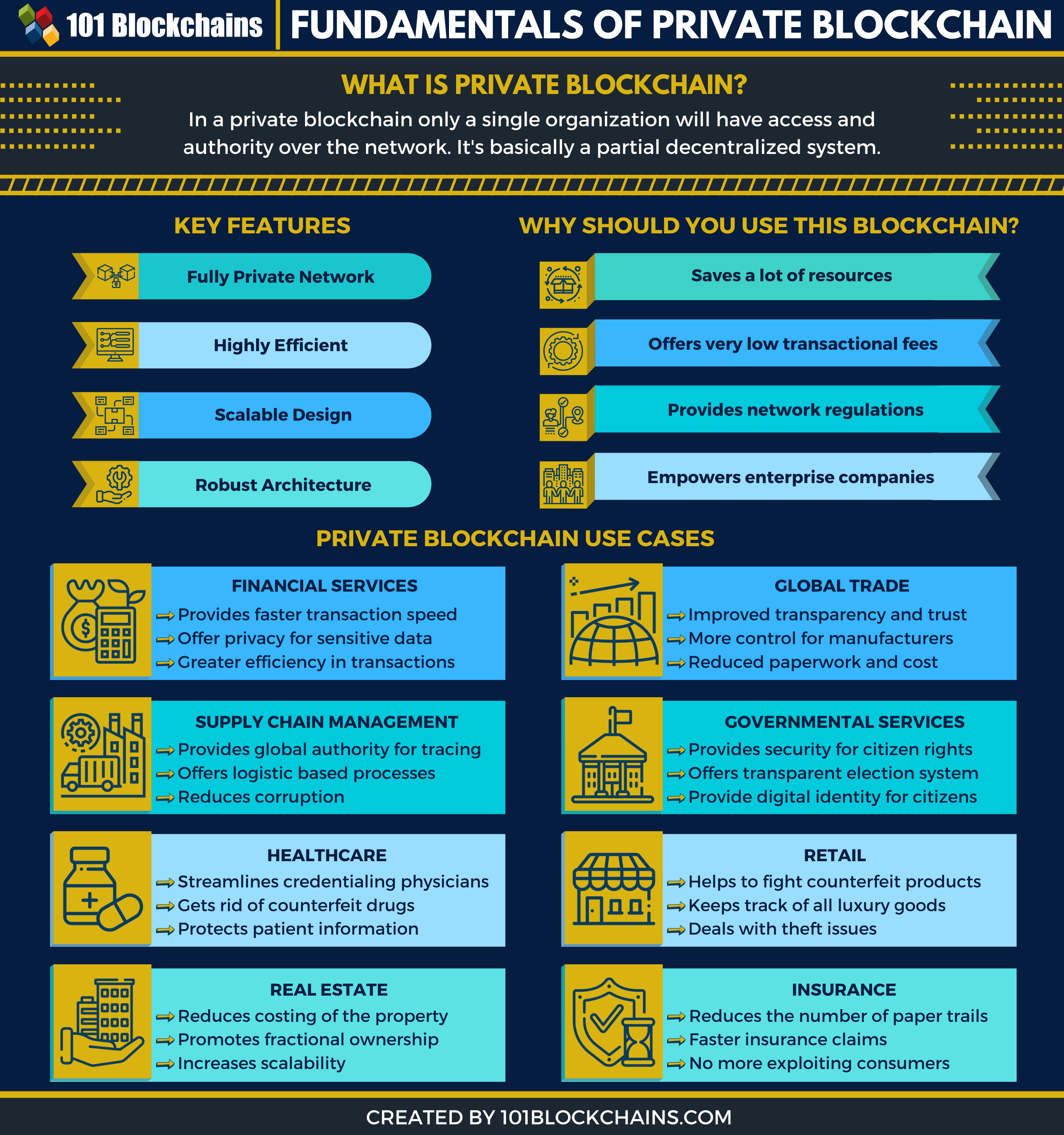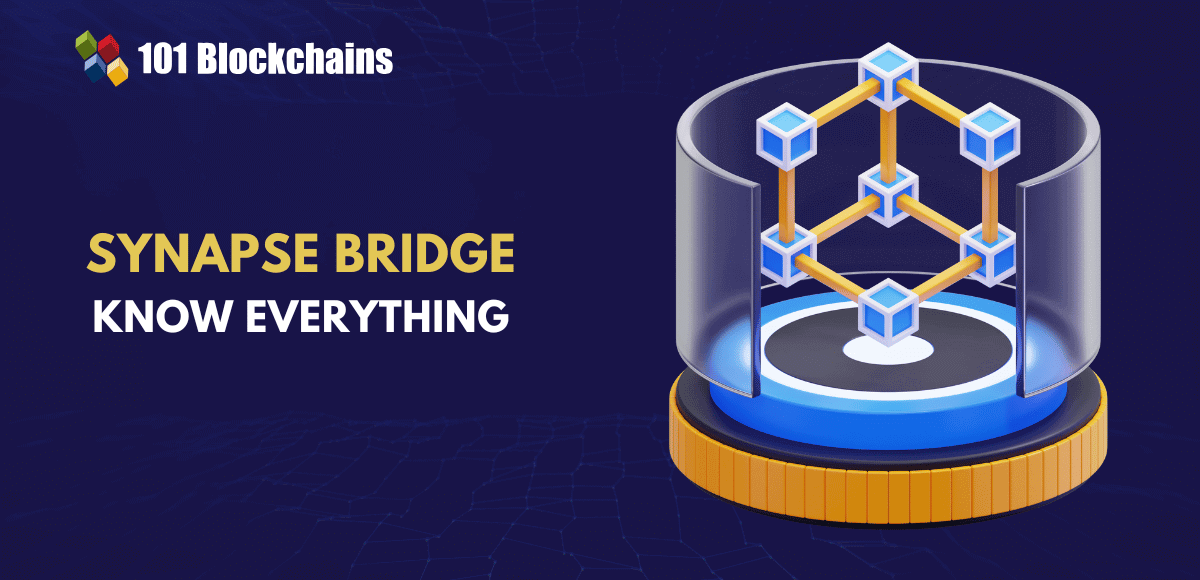Learn how blockchain truly works, master key definitions, and uncover what makes smart contracts so "smart." Dive into the fundamentals, gain valuable insights, and start your blockchain journey today!

- Blockchain
Gwyneth Iredale
- on February 15, 2021
The Rise Of Private Blockchain Technologies
This article will focus on the basics of private blockchain technology, as well as its features, differences between private and public blockchain technologies, popular platforms, and the use cases of private blockchain technologies.
A private blockchain is one of the popular types of blockchain technology at the moment. Basically, there are three types of blockchain technology – Public, Private, and Federated. Based on how each of their characteristics is, companies use them in their own solutions. If you use private blockchain applications in a solution where the public or federated system is necessary, then that solution won’t become successful. Thus, it’s really important to know what kind of private blockchain platforms you are using.
Build your identity as a certified blockchain expert with 101 Blockchains’ Blockchain Certifications designed to provide enhanced career prospects.
Please include attribution to 101blockchains.com with this graphic. <a href='https://101blockchains.com/blockchain-infographics/'> <img src='https://101blockchains.com/wp-content/uploads/2020/05/private-blockchain.png' alt='private blockchain='0' /> </a>
What is Private Blockchain?
Before we move into using private blockchains in different sectors, let’s see what is a private blockchain in the first place. In simple terms, a private blockchain is a type of blockchain network where only a single authority or organization has control over the network.
Yeah, it seems like it doesn’t directly resonate with the main concept of blockchain now, does it? Well, even though private blockchain examples may seem like a centralized network, in reality, they can offer partial decentralization. Also, in a network like this, you can’t get an entry without any reason. In reality, this type of network is far suited as the internal technology for an enterprise. Why?
Well, because as everything is dependent on technology nowadays, the previous ones simply can’t keep up with the changing times. As a result, there are a lot of issues such as data theft, identity hacking, and so on.
Therefore, to safeguard a company’s sensitive information, using private blockchains is the perfect option. So, without proper authentication, no one can enter this type of network. To make sure that any company can use blockchain, there are many blockchain companies that are working towards bringing a private version just for the sake of secrecy.
For example, Ethereum used to be a solely public platform. But now EEA is bringing Ethereum private blockchain with the same features and additional privacy for these high-end companies.
Market Reaction
Well, there are some controversies regarding private blockchains. For example, many people think that using this tech doesn’t mean you are using the core blockchain values. That may be true, but the platform does come with all the features except it’s only private. But for enterprise companies, a public blockchain isn’t that suitable as there is much sensitive information that can get leaked. And so, private blockchains or enterprise blockchains are extremely popular among high-end companies.
What Are the Best Features of Private Blockchain?
-
Full Privacy
In reality, private blockchain platforms focus mainly on privacy instead of full disclosures. So, if you are interested in a technology where privacy is the greatest concern, then private blockchains are surely for you.
On the other hand, an enterprise needs security and privacy because they always deal with cyber-attacks. Also, as they are dealing with sensitive information all the time, it makes it difficult to keep everything at bay. Thus, if a company can use a private blockchain to tighten up its security facilities, then it’ll be impossible for any hacker to hack into the system.
Start learning Blockchain with World’s first Blockchain Skill Paths with quality resources tailored by industry experts Now!
-
High Efficiency
This type of blockchain platform offers the highest level of efficiency. In reality, private blockchain examples can show you that they work much better than traditional public blockchain platforms. But why? Well, it’s because in private, only a handful of pre-authorized nodes get an entry. So, there is no way the nodes can take up more resources than usual. But in a public blockchain, there are no limits to the number of nodes. As a result, the system slows down drastically when there are too many participants. But the private network is immune to that issue.
-
Scalability
Actually, private platforms are more stable, and you will get the best performance out of it. The same goes for scalability. For a business to work efficiently, it should be scalable. So, with time it has to grow as well. But in a public blockchain, when the network starts to grow after a certain time, it starts to slow down as well. This is called a scalability issue. But private networks seem to be past this issue as it can grow but not slow down in any case. More so, this results in reduced fees, faster transactions, and so on.
-
Robust Architecture
In reality, private networks have one of the robust network structures at the moment. They are made to be resilient to any issues. That’s why they come with a good level of security protocols that helps to keep malicious activities at bay. In some of the platforms, you may even see firewall-type feature that protects all the information within the ledger from outside and insider presence. I guess technically, an organization may alter transaction if they want to, but that is highly unlikely and will not go unnoticed.
Start your blockchain journey Now with the Enterprise Blockchains Fundamentals
Why Use This Type of Blockchain?
-
Saves Resources
If you look at private blockchain examples, you will see that these platforms are saving a lot of resources. In reality, maintaining a private system is fairly simple and doesn’t need that much attention. Thus, they take up only a handful of resources from public blockchain platforms. So, you get to save a lot of money and manpower that needs for these solutions. However, it doesn’t mean that it will be entirely cheap or something. But compared to other efficient technologies like this, it’s the cheapest!
-
Low Fees
In this network, you can transact with the minimum fees. Most of the time, you may not even need a fee, to begin with. In reality, this is completely a great reason to start with private blockchains. Also, these blockchains, in many cases, don’t have a native token for the network. Thus, any kind of negative impact that cryptocurrencies may bring won’t be here.
-
Regulations
Another good reason to use this network is the regulations. All the private blockchain examples in the real-world revolve around regulations. Actually, enterprise companies can’t work without a regulatory system.
And so, there should be a proper way to perform certain tasks, and not following the rules will result in consequences. Thus, it assures more security for the participants.
-
No Illegal Parties
This is one of the benefits of using private blockchain as it does not offer any scope for any unknown third party to enter the network. Thus, it makes sure that no one can use the channel for their illegal activities. Unlike public blockchain, private blockchain take this issues seriously as it can hamper the reputation of the company.
-
Empowering Enterprise Organizations
Unlike public blockchain, private blockchain platforms are more focused towards companies or organizations. These do not want to empower the users but rather the company as whole.
Curious to learn about blockchain implementation and strategy for managing your blockchain projects? Enroll Now in Blockchain Technology – Implementation And Strategy Course!
Public Vs Private Blockchain
I’ll briefly explain the main difference between public vs private blockchain. Many of you are often confused about the difference between these two types, so it’s better to get it cleared up. In a public blockchain, everyone and anyone can join the network, on the other hand, only selected nodes can enter private blockchains. Also, private blockchains are partially decentralized, and public ones are fully decentralized. But in terms of transaction speed, cost, or efficiency, public blockchain falls behind greatly.
This is one of the major differences in public vs private blockchain. As we are on the topic, you might want to check the comparison between private vs consortium blockchain technologies as well. But private blockchain also lacks in immutability, access, and so on. Anyhow, hopefully, the table below will shed more light on this topic. So, check it out!
| Public Blockchain | Private Blockchain | |
|---|---|---|
| Access | Anyone | Single Organization |
| Transaction Cost | High | Low |
| Transaction Speed | Slow | Fast |
| Authority | Decentralized | Partially decentralized |
| Immutability | Full | Partial |
| Data Handling | Read and Write access for anyone | Read and Write access for a single organization |
| Consensus | Permissionless | Permissioned |
| Efficiency | Low | High |
Private Blockchain Platforms
There are many private blockchain platforms that are perfect for enterprise use cases. So, I’ll briefly introduce them one by one.
-
Enterprise Ethereum
In reality, Enterprise Ethereum is actually one of the new additions as of today. Ethereum is actually a public blockchain that got traction based on the features it introduced. But it was difficult for enterprise companies to even use up those features as it’s fully a public network. That’s why EEA or Enterprise Ethereum Alliance started to roll out an Ethereum private blockchain version just for the sake of commercial use. So, this Ethereum private blockchain offers a new type of private network that uses public network benefits as well. More so, the Ethereum private blockchain also updates based on the public network as well. So, it will continue to grow into a vaster network.
-
Hyperledger Fabric
This is one of the popular private blockchain platforms on the list so far. In reality, Hyperledger Fabric is full of features that anyone can use in any kind of industry. Also, it comes with permissioned access, so any member has to authorize their identities before they can get in it. Check out more information on permissioned blockchain here.
More so, it comes with a modular structure, which means you can plug and play any type of item in this. Furthermore, it allows you to customize to a great length. The transaction speed is fast and, in reality, excels at any other platform in the marketplace.
Want to know more about hyperledger fabric? Enroll Now in Getting Started with Hyperledger Fabric Course
-
Corda
Corda is another great platform that you should look into. In reality, Corda has two types of versions one is open-source, and another one is for commercial usage. But Corda blockchain is more suited for financial industries such as banking sectors, insurances, real estate, and so on. But it is evolving, so any company that is looking for ways to update their financing networking system can check out Corda. Also, Corda happens to offer the best possible firewall against any online attacks. So, it’s a great option to use as a security system.
-
Ripple
Ripple is another private blockchain platform, that is solely for the financial sector. In reality, it comes with a native token of its own and using this, you can complete transactions within seconds. Anyhow, previously many people thought that Ripple is only suited for finance industries. But slowly even Governments are starting to use this platform for their own benefits. The transaction costs for this platform are relatively low, and it offers a secured consensus protocol. Anyhow, for using this platform, you have to download RippleNet.
-
Quorum
Quorum is the last one on our list. JP. Morgan is the one behind the success of Quorum. In reality, Quorum is actually a private version of Ethereum. But the developers tweaked the Ethereum platform to make certain moderations and make it enterprise-friendly. Anyhow, Enterprise Ethereum and Quorum aren’t the same things. So, make sure not to confuse them. They both use different methods and different protocols to reach consensus. Also, their privacy policies are different.
Want to learn the basics of blockchain quickly? Check: Blockchain Basics Flashcards
What Are the Use Cases of a Private Blockchain?
-
Financial Services
Well, private blockchain companies make sure that every single network is suitable for financial services. And to be frank, the blockchain network is perfectly suited for that. Usually, financial services have a lot of issues, such as vulnerable networking systems, slow transaction speed, and so on. But with the help of private blockchains, the financial sectors can get a massive boost. Also, the cost of completing international payments will also lower down as well. More so, it will enhance efficiencies, offer transparency, and so on. But you have to ensure that your blockchain solution is capable of warding off hacking problems.
-
Trading
Trading industries is also another major target for trading companies. In reality, more than $18 trillion of goods go through trading processes every year. But to have things going smoothly, the companies need better control over the whole system. Using this, the trading sector can track their products even on route. Also, the company can know when they will get the products through the tracking process as well. Anyhow, securing the payment for an order lot is also important here. As you can guess, trade finance blockchain has been booming in recent years.
-
Supply Chain Management
Supply chain management is one of the popular private blockchain use cases. In reality, private blockchain companies tend to make platforms solely for supply chain industries, as it’s a huge opportunity. And in real life, the outcomes of blockchain for supply chain are so positive as well. Many companies are already using private blockchain for this sector, and they are seeing increased revenues.
More so, even customers get a transparent outcome where they know just how or where they got their products. It’s a great way to offer product authenticity and reduce counterfeit issues once and for all.
Want to learn more about the possibilities of private blockchain implementation in your organization’s supply chain management? Enroll in our Enterprise Blockchains and Supply Chain Management Course now!
-
Retail
Retail is a wonderful sector where private blockchain applications can bloom to its fullest. Even though this sector wasn’t so welcoming to this technology at the very start, but it’s now slowly incorporating it as well. Anyhow, counterfeit retail products seem to be one of the major issues of this sector. And with the help of blockchain in retail, they can track their products from the manufacturers to the retailer shops. So, there is always a way to guard against any malicious problems that come along the delivery of the products. Walmart and Alibaba seem to be two of the biggest names in this sector.
-
Governmental Services
Governmental services may seem like a far fetch option, but it’s actually one of the sectors that are falling behind fast. As of today, the sector is filled with corruption, and no other sector faces this much corruption in the world. Thus, people are soon losing their faiths in this type of industry. Also, the process of taking governmental services is rather slow. But with the help of private blockchain applications, it can finally get rid of any corruption. More so, it can offer better services that are fast and trustworthy for the people. There are already many government services using this tech, because of the plethora of use cases of blockchain for government.
-
Healthcare
Healthcare is truly a wonderful sector that needs a change ASAP. Why? Well, this sector doesn’t offer patient confidentiality, and as a result, there are lots of data that gets leaked to the system. Thus, private blockchain companies can help out to eliminate all those issues. They can offer patient confidentiality and offer access to doctors with the permission of patients. More so, it also gets rid of counterfeit drugs and other management problems as well. But most importantly, blockchain for healthcare can eliminate the change of false certification among doctors. In turn, it ensures better treatment policies.
-
Real Estate
Private blockchain companies are made for real estate sectors as well. In reality, the market deals with high cost, poor liquidity, inaccessibility. It happens to be the only the upper class now has access to real estate properties. But it seems to get out of hand for lower- or middle-class people. But will the help of private networks this sector can bloom. It can finally offer people fractional ownership and then use that to benefit them as well. Blockchain for real estate also secures the process of payment and gets rid of any underlying criminal problems.
-
Insurance
Private blockchain applications can shine in insurance industries. In reality, this sector is prone to issue, such as accountability and paper trails. Compilations such as excess paperwork and insurance claim really slow down the whole process. Thus, it’s necessary for a private network to offer its benefits to this sector for good. Anyhow, using the technology, you can automate the whole insurance claim process and therefore save the burden of waiting in line. The whole process is automated and smooth in blockchain for insurance. So, there are no lingering issues at all.
Start learning Blockchain with World’s first Blockchain Career Paths with quality resources tailored by industry experts Now!
In the End
Private blockchains are one of a kind technology, specifically suited for enterprises. There are already so many solutions that are based on private blockchains. Also, even though many people may think that private blockchains are just glorified centralized database systems, the reality is quite different. There are many examples to prove that now. For example, many high-end companies use Fabric as the base of their blockchain solutions. More so, these solutions are working with a high level of efficiency.
*Disclaimer: The article should not be taken as, and is not intended to provide any investment advice. Claims made in this article do not constitute investment advice and should not be taken as such. 101 Blockchains shall not be responsible for any loss sustained by any person who relies on this article. Do your own research!







